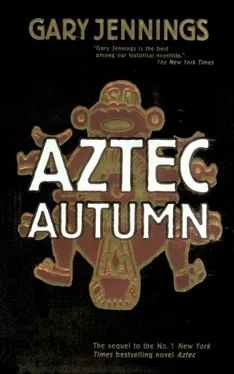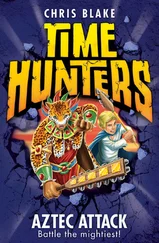Gary Jennings - Aztec Autumn
Здесь есть возможность читать онлайн «Gary Jennings - Aztec Autumn» весь текст электронной книги совершенно бесплатно (целиком полную версию без сокращений). В некоторых случаях можно слушать аудио, скачать через торрент в формате fb2 и присутствует краткое содержание. Жанр: Старинная литература, на английском языке. Описание произведения, (предисловие) а так же отзывы посетителей доступны на портале библиотеки ЛибКат.
- Название:Aztec Autumn
- Автор:
- Жанр:
- Год:неизвестен
- ISBN:нет данных
- Рейтинг книги:4 / 5. Голосов: 1
-
Избранное:Добавить в избранное
- Отзывы:
-
Ваша оценка:
- 80
- 1
- 2
- 3
- 4
- 5
Aztec Autumn: краткое содержание, описание и аннотация
Предлагаем к чтению аннотацию, описание, краткое содержание или предисловие (зависит от того, что написал сам автор книги «Aztec Autumn»). Если вы не нашли необходимую информацию о книге — напишите в комментариях, мы постараемся отыскать её.
Readers familiar with Mexican history will welcome the rich details of this vengeance drama; those new to it will be impressed by Jennings's exhaustive research.
Aztec Autumn — читать онлайн бесплатно полную книгу (весь текст) целиком
Ниже представлен текст книги, разбитый по страницам. Система сохранения места последней прочитанной страницы, позволяет с удобством читать онлайн бесплатно книгу «Aztec Autumn», без необходимости каждый раз заново искать на чём Вы остановились. Поставьте закладку, и сможете в любой момент перейти на страницу, на которой закончили чтение.
Интервал:
Закладка:
We both turned to look again at G'nda Ké's skeleton, now quietly falling apart as it lay there, and Ualíztli said, in a voice of awe, "Neither I nor the spider put that woman to death. She had been dead, Tenamáxtzin, for sheaves of sheaves of years before you or I were born."
We emerged from the hut to see that Mayo tícitl dashing about the village and jabbering at the top of his voice. In his immense and supposed-to-be-dignified mask, he looked very foolish and the other Mayo were regarding him with incredulity. It occurred to me that if the whole village should get excited about the uncommon manner of G'nda Ké's dissolution, the elders might still have reason for suspicion of me. I decided to remove all traces of the woman's death. Let it be even more of a mystery, so the tícitl's fantastic account would be un-provable. To Ualíztli I said:
"You told me you carry something combustible in that sack." He nodded and took out a leather pouch of liquid. "Splash it all on the hut." Then, rather than go and take a brand from the cooking fire that stayed always alight in the middle of the village, I surreptitiously employed my burning-glass, and in moments the cane-and-reed hut was blazing. The people all stared in amazement at that—and Ualíztli and I pretended to do the same—as it and its contents burned to ashes.
I may have ruined forever the local tícitl's reputation for truthfulness, but the elders never summoned me to demand an explanation of those strange occurrences. And, during the next days, the warriors from other villages came straggling in from various directions, all well armed and appearing eager to get on with my war. When I was informed, by gestures, that I had collected every available man, I sent them south with Machíhuiz, and Acocótli went off northward with another Yaki, to spread the word among the Desert People.
I had already decided that Ualíztli and I would not make the arduous mountain journey to Chicomóztotl, but would take an easier and quicker course. We left Bakúm and went west, along the river, through the villages of Torím, Vikám, Potám and so on—those names, in the unimaginative Yaki manner, meaning the "places of," respectively, wood rats, arrow points, gophers and so on—until we came to the seaside village of Be'ene, "sloping place." Under other circumstances, it would have been suicidal for two strangers to essay such a journey, but of course all the Yaki by now had been told who we were, and what we were doing in these lands, and that we had the sanction of the yo'otuí of Bakúm.
As I have said, the Káhita men of Be'ene do some fishing off that Western Sea shore. Since most of the men had gone off to enlist in my war, leaving only enough fishers to keep the village fed, there were a number of their seaworthy acáltin not being used. I was able, with gestures, to "borrow" one of those dugout canoes and two paddles for it. (I did not expect ever to return those things, and I did not.) Ualíztli and I stocked our craft with ample supplies of atóli, dried meats and fish, leather bags of fresh water, even one of the fishermen's three-pronged cane spears, so we could procure fresh fish during our voyage, and a brownware pot full of charcoal over which to cook them.
It was my intent that we would paddle to Aztlan—rather more than two hundred one-long-runs distant, I calculated, if one can speak of "runs" on water. I was eager to see how Améyatl was faring, and Ualíztli was eager to tell his fellow tíciltin about the medically marvelous two deaths he had witnessed while in my company. From Aztlan, we would go inland to rejoin the Knight Nochéztli and our army at Chicomóztotl, and I expected we would reach there at about the same time the Yaki and To'ono O'otam warriors did.
I was unacquainted with the Western Sea that far north, where it borders the Yaki lands, except that I knew—Alonso de Molina had told me—that the Spaniards called it Mar de Cortés, because the Marqués del Valle had "discovered" it during his idle wanderings about The One World after he was deposed from his rulership of New Spain. How anyone could presumptuously claim to discover something that had existed since time began, I do not know. Anyway, the Be'ene fishermen informed me, with unmistakable gestures, that they fished only close inshore, because farther out the sea was dangerous, having strong and unpredictable tidal currents and vagarious winds. That information did not much dismay me, for I certainly intended to keep just outside the surf line the whole way.
And, for many days and nights, that is what Ualíztli and I did, paddling in unison, then taking turns at sleeping while the other paddled. The weather stayed clement and the sea stayed calm, and the voyage during those many days was more than pleasant. We frequently speared fish, some of them new to both of us, but delicious when broiled over the charcoal fired by my lente. We saw other fish—those giants called yeyemíchtin—which, even if we had somehow speared one, we could not have cooked over any pot smaller than the crater of Popocatépetl. And sometimes we would knot our mantles in such a way that they could be dragged through the water behind us to scoop up shrimp and crayfish. And there were the flying fish, which did not have to be caught at all, because one of them would leap into our acáli almost every other day. And there were turtles, large and small, but of course too hard-shelled to be speared. Now and then, when we saw no people on shore to whom we would have to explain ourselves, we put in just long enough to gather whatever fruits, nuts and greens were in season, and to replenish our water bags. For a long while, we lived well and enjoyed ourselves immensely.
To this day, I almost wish the voyage had continued so. But, as I have remarked, Ualíztli was not young, and I will not blame that good old man for what happened to interfere with our serene progress southward. I woke from one of my stints of sleep, in the middle of the night, feeling that I had somehow overslept my allotted time, and wondering why Ualíztli had not waked me to take my turn at paddling. The moon and stars were thickly clouded over, the night so very black that I could see nothing whatever. When I spoke to Ualíztli, then shouted, and he made no answer, I had to grope my way all along the acáli to ascertain that he and his paddle were gone.
I will never know what became of him. Perhaps some monster sea creature rose from the night waters to snatch him from where he sat, and did it so silently that I never woke. Perhaps he was stricken with some one of the seizures not uncommon in old men—for even tíciltin die—and, flailing in its grip, inadvertently threw himself over the acáli's side. But it is more likely that Ualíztli simply fell asleep and toppled over, paddle in hand, and got a mouthful of water before he could call for help, and so drowned—how long ago and how far away I had no idea.
There was nothing I could do but sit and wait for the day's first light. I could not even use the remaining paddle, because I did not know how long the acáli had been adrift or in which direction the land lay. Usually, at night, there was an onshore wind, and we had so far kept our course in the dark by keeping that wind always on the paddler's right cheek. But the wind god Ehécatl seemed to have chosen this worst possible night to be whimsical; the breeze was only light, and puffed at my face first on one side, then the other. In air so gently moving, I should have been able to hear the sea's surf, but I heard nothing. And the canoe was rocking more than was usual—that was probably what had waked me—so I feared that I had been carried some distance away from the solid, safe shore.
The first glimmer of day showed me that that was what had happened, and had happened to a distressing degree. The land was nowhere in sight. The glimmer at least enabled me to know which way was east, and I seized up my paddle and began stroking furiously, frantically, in that direction. But I could not hold a steady course; I had been caught in one of those tidal currents the fishermen had told of. Even when I could keep the prow of the acáli pointed east toward land, that current moved me sideways. I tried to take some comfort from the fact that it was carrying me south, not back northward again or—horrible to contemplate—carrying me west and farther out to sea, out where nobody had ever gone and returned from.
Читать дальшеИнтервал:
Закладка:
Похожие книги на «Aztec Autumn»
Представляем Вашему вниманию похожие книги на «Aztec Autumn» списком для выбора. Мы отобрали схожую по названию и смыслу литературу в надежде предоставить читателям больше вариантов отыскать новые, интересные, ещё непрочитанные произведения.
Обсуждение, отзывы о книге «Aztec Autumn» и просто собственные мнения читателей. Оставьте ваши комментарии, напишите, что Вы думаете о произведении, его смысле или главных героях. Укажите что конкретно понравилось, а что нет, и почему Вы так считаете.











